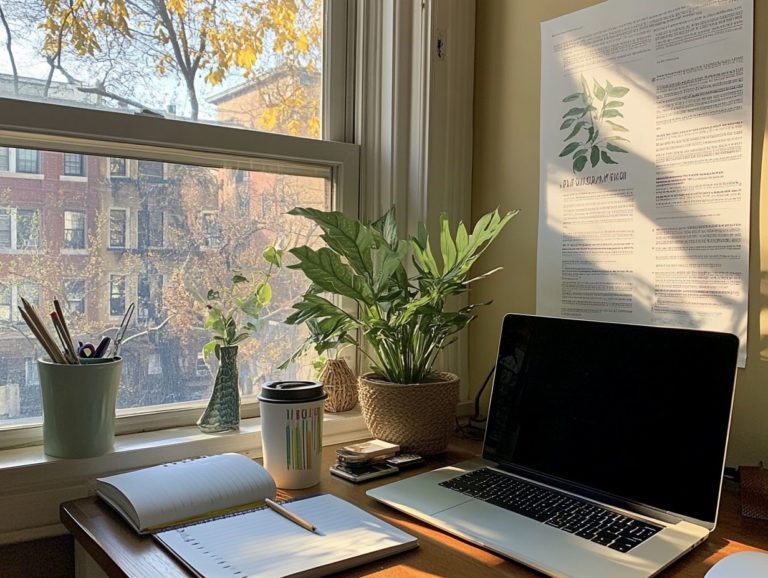7 Effective Techniques to Stop Procrastinating
Ready to conquer procrastination? Here are seven powerful techniques to transform your productivity!
Procrastination can stand as a significant barrier to achieving your goals, often leaving you feeling overwhelmed and stressed. If you frequently find yourself deferring tasks until the last possible moment, rest assured you’re not alone in this struggle.
By setting specific goals and creating a distraction-free environment, you ll discover practical strategies that can enhance your productivity. We will explore the reasons for procrastination and identify when it may be wise to seek professional guidance.
Don’t wait! Start implementing these strategies today to take charge of your time!
Contents
- Key Takeaways:
- 1. Set Specific and Realistic Goals
- 2. Break Down Tasks into Smaller, Manageable Chunks
- 3. Create a Schedule or To-Do List
- 4. Use Time Management Techniques
- 5. Eliminate Distractions
- 6. Reward Yourself for Accomplishing Tasks
- 7. Change Your Environment
- Why Do People Procrastinate?
- Frequently Asked Questions
- What are the 7 effective techniques to stop procrastinating?
- How can setting clear goals help with procrastination?
- Why is creating a schedule important for overcoming procrastination?
- How can breaking tasks into smaller chunks help with procrastination?
- What are some common distractions to avoid when trying to overcome procrastination?
- How can practicing mindfulness help with procrastination?
- Why is it important to reward yourself when trying to stop procrastinating?
Key Takeaways:

- Set specific and realistic goals to give yourself a clear direction and motivation to complete tasks.
- Breaking down tasks into smaller, manageable chunks can make them feel less overwhelming and easier to start.
- Create a schedule or to-do list to hold yourself accountable and track your progress.
1. Set Specific and Realistic Goals
Setting specific and realistic goals is essential in your battle against procrastination. It transforms daunting tasks into manageable steps that can significantly boost your productivity and mental well-being.
When you define clear objectives, you re better equipped to navigate emotional challenges and allocate your resources effectively. This ultimately fosters a sense of accomplishment and motivation to propel yourself forward.
This approach not only helps diminish the paralyzing grip of perfectionism but also addresses the fear of failure that often looms over large projects. Mental health professionals like Lauryn Higgins and Samina Ahmed Jauregui advocate for breaking down these goals into smaller, actionable steps.
They recommend a method called SMART that helps set clear goals ensuring your goals are Specific, Measurable, Achievable, Relevant, and Time-bound. By regularly assessing your progress and adjusting your goals as necessary, you can cultivate a more adaptive mindset.
This paves the way for sustained achievement and resilience in the face of challenges.
2. Break Down Tasks into Smaller, Manageable Chunks
Breaking tasks down into smaller, manageable chunks can significantly ease any aversion you might feel. This method makes it much simpler to tackle daunting projects without falling into the trap of procrastination.
By concentrating on small victories, you can gradually build momentum and enhance your emotional regulation key elements in overcoming procrastination.
This approach not only lessens feelings of overwhelm but also cultivates a positive mental state. Each completed task contributes to your sense of achievement.
If you’re facing larger projects, strategies like setting specific, short-term goals or utilizing a checklist can create clear pathways for progress.
Partnering with an accountability buddy can amplify these benefits. Discussing obstacles and celebrating successes together keeps your motivation soaring. These practical steps help you organize your tasks effectively while fostering healthier emotional management throughout the process.
3. Create a Schedule or To-Do List
Creating a schedule or to-do list is a highly effective time management technique that allows you to counter common procrastination triggers. By establishing a structured framework for your daily routines and prioritizing tasks, you enhance your productivity while cultivating positive self-talk and accountability.
Incorporating various productivity techniques, such as the Pomodoro Technique or time blocking which means allocating specific blocks of time for different tasks throughout your day gives you the power to manage your time with precision.
Additionally, gamification techniques, like setting up reward systems or competing with yourself, transform the process into something engaging and enjoyable.
Crafting an effective to-do list is equally crucial. Prioritizing tasks based on urgency and importance paves the way for a streamlined approach. Visualizing your success not only amplifies your motivation but also reinforces a positive mindset.
This creates a powerful psychological impact that propels you toward overcoming challenges and achieving your goals.
4. Use Time Management Techniques
Break your work into intervals. Regular breaks can improve your managing your feelings and task completion rates.
Using the Pomodoro Technique, a time management method that uses intervals of work followed by short breaks, can significantly enhance your focus and tackle chronic procrastination. For more strategies, check out these 7 ways to find focus and stop procrastinating. This structured approach also helps overcome productivity barriers that might be hindering your progress.
Another valuable method is prioritizing tasks using the Eisenhower Matrix. This tool helps you discern between what s urgent and what s important, effectively reducing feelings of overwhelm. By categorizing your tasks, you can concentrate on high-impact activities first, fostering a more balanced emotional state.
Techniques like time blocking where you allocate specific time slots for different activities can also alleviate the anxiety that comes with last-minute rushes.
When you visually organize your day, it becomes much easier to stay committed and present. This ultimately leads to greater productivity and a notable reduction in procrastination.
5. Eliminate Distractions

Eliminating distractions is essential for maintaining your focus and combating the loss of self-control that often accompanies procrastination. To help with this, consider implementing strategies to boost your willpower and address emotional challenges to create an environment that truly fosters productivity.
Identify the distractions disrupting your workflow think digital notifications, the siren call of social media, or even the background noise of your environment.
Try these powerful strategies now:
- Create a designated workspace that s free from clutter.
- Use website blockers during your working hours.
- Set specific time blocks for each task.
Personalizing your workspace to enhance comfort and minimize interruptions can also make a significant difference. By cultivating such an environment, you not only enhance your focus but also nurture managing your feelings, which is key to sustaining long-term productivity and breaking free from the cycle of procrastination.
6. Reward Yourself for Accomplishing Tasks
Implementing a reward-based system for accomplishing tasks can significantly enhance your motivation and reinforce positive self-talk, making it essential for overcoming the pitfalls of procrastination. By celebrating your small victories, you cultivate a sense of achievement that propels you forward and instills accountability.
Rewards can take many forms, from treating yourself to a favorite snack after finishing a task to indulging in a soothing activity like reading a book or watching a movie. These enjoyable rewards act as powerful incentives, seamlessly integrating into your daily routine.
Having accountability partners can elevate this strategy even further. Sharing your goals with someone who genuinely supports your efforts creates a nurturing environment that fosters growth.
The psychological benefits of recognizing and rewarding your accomplishments not only boost self-esteem but also establish a positive cycle of motivation and achievement, leading you toward a more fulfilling and productive life.
7. Change Your Environment
Changing your environment can significantly enhance your emotional wellness and help you break free from the productivity barriers that often lead to procrastination. A well-designed workspace can dramatically reduce those pesky procrastination triggers and foster greater focus.
By tailoring your surroundings to create a positive and motivating atmosphere, you can transform your approach to work.
Consider the impact of:
- Lighting
- Organization
- Overall ambiance
These factors play a crucial role in how you feel and perform tasks. For example, embracing natural light can boost your mood and sharpen your concentration. Minimizing clutter can cultivate a sense of order that is essential for maintaining mental clarity.
Incorporating plants or personal touches can deepen your connection to the space, making it feel more inviting and stimulating. To further enhance your productivity, establish clear boundaries for your work hours, and consider using noise-canceling headphones to drown out distractions.
Actively shaping these elements can supercharge your productivity and emotional well-being!
Why Do People Procrastinate?
Understanding why you procrastinate is vital for tackling the root causes of this behavior. It may stem from perfectionism, fear, emotional regulation issues, or anxiety. These underlying reasons can lead to chronic procrastination, affecting various aspects of your life and mental well-being.
Experts like Jeff Temple delve into the complexities of procrastination, highlighting that it often arises from a tangled web of flawed thinking patterns and behavioral tendencies.
Research from institutions such as the University of Texas Medical Branch reveals that self-doubt can cause you to shy away from tasks that provoke feelings of inadequacy.
It’s crucial to recognize that procrastination isn’t simply a matter of lacking willpower; it often reflects deeper emotional challenges, such as fear of failure or a longing for validation. This insight can open the door to more effective strategies, helping you cultivate healthier habits and nurturing a more productive mindset.
What Are the Common Excuses for Procrastination?
Common excuses for procrastination often arise from emotional challenges and self-sabotaging behaviors, manifesting as task aversion and creating a cycle that sustains both delay and inaction. Recognizing these excuses is your first step toward breaking free from procrastination’s grip.
You might find yourself claiming you work better under pressure or that you need a burst of motivation to get started, using these justifications as a shield against personal accountability. You may also feel overwhelmed by the sheer size of a task, convincing yourself that it s wiser to wait until you feel more prepared.
Confronting these excuses requires a shift in your mindset. Instead of waiting for the elusive perfect moment, it’s vital to embrace small, manageable steps. By setting realistic goals and establishing a structured routine, you can cultivate healthier habits and combat that instinct to procrastinate, ultimately leading to a more productive and fulfilling life.
Start today by defining one small step you can take!
How Can Procrastination Affect Your Life?

Procrastination can profoundly impact various facets of your life, including mental health, long-term health issues, and overall emotional regulation. It often results in increased anxiety and stress, influencing your long-term goals and overall well-being.
Studies reveal that nearly 20% of adults consider themselves chronic procrastinators, creating a vicious cycle that undermines productivity and stifles personal development. Emotionally, procrastination can breed feelings of guilt and inadequacy, potentially leading to depression and diminished self-esteem.
Research published by Women s Health underscores that procrastination can worsen symptoms of chronic illnesses, ultimately affecting your quality of life. On a professional level, this behavior can obstruct career advancement and collaboration, straining relationships and creating an overwhelming workload.
Thus, embracing effective time management strategies is crucial to alleviate these emotional burdens and enhance both your personal and professional realms.
What Are the Benefits of Overcoming Procrastination?
Overcoming procrastination brings a wealth of benefits, from enhanced mental wellness and better emotional regulation to improved productivity techniques. Exploring 7 ways to cultivate a can-do attitude against procrastination can help you face your fear of success and reach your long-term goals.
The ripple effect of defeating procrastination can lead to a more fulfilling and balanced life. For instance, once you start managing your time effectively, you may experience a profound sense of relief and accomplishment.
One former procrastinator reflected on how finally tackling overdue tasks not only boosted their self-esteem but also cultivated a greater sense of discipline that spilled over into other areas of their life.
Emotional stability often leads to healthier relationships, both personally and professionally. As you sharpen your focus and develop productive habits, you may notice a remarkable surge in creativity, turning your ambitions and dreams into actionable plans.
When you conquer procrastination, you unlock benefits that enrich your entire life journey. Start today for a more fulfilling future!
What Are Some Additional Tips to Stop Procrastination?
You have powerful strategies at your fingertips to combat procrastination, from personalized techniques that address your specific challenges to broader motivational methods you can seamlessly integrate into your daily routine. Consider exploring 7 time management tips to end procrastination, as these approaches, including methods that help change habits, can drive lasting change and significantly elevate your productivity.
Recognizing that everyone has unique triggers for procrastination is vital. You might find that setting small, achievable goals gives you a gratifying sense of accomplishment, while someone else might thrive by using 7 ways to stay on task to maintain their focus.
Experts recommend curating a cozy workspace that minimizes distractions or utilizing tools like timers to sharpen your concentration. Engaging in reflective practices, such as journaling about your feelings toward various tasks, can help you uncover patterns and fears linked to procrastination. For more strategies, consider exploring 7 ways to stay motivated and beat procrastination, enabling you to devise targeted solutions.
Connecting with accountability partners or groups can provide motivation and create a supportive environment, making it easier for you to tackle obstacles together.
When Should You Seek Professional Help for Procrastination?
Seeking professional help for procrastination is crucial, especially if it affects your mental health. A mental health expert can provide tailored strategies that address the root causes of your procrastination.
Look for signs that indicate you may need support. If you consistently delay tasks and feel anxious about deadlines, it s time to take action and seek help.
Procrastination can trap you in a cycle of negative thoughts. This can harm your emotional well-being. In consultations, you will uncover the reasons behind your procrastination like fear of failure and learn practical techniques to take back control.
Finding the right resources involves looking for licensed therapists or counselors who focus on techniques like cognitive-behavioral therapy (a method to change negative thought patterns) and time management strategies.
Frequently Asked Questions
What are the 7 effective techniques to stop procrastinating?

The 7 techniques for overcoming procrastination are: setting clear goals, creating a schedule, breaking tasks into smaller chunks, avoiding distractions, rewarding yourself, using the 2-minute rule, and practicing mindfulness.
How can setting clear goals help with procrastination?
Having a clear goal in mind can motivate you to start tasks and stay on track. It also helps break down larger projects into smaller, more manageable goals.
Why is creating a schedule important for overcoming procrastination?
A schedule provides structure and accountability. It allows you to prioritize tasks and allocate specific time slots for completing them.
How can breaking tasks into smaller chunks help with procrastination?
Breaking tasks into smaller pieces makes them feel less overwhelming and easier to start. This approach allows you to focus on one task at a time, reducing the temptation to procrastinate.
What are some common distractions to avoid when trying to overcome procrastination?
Common distractions include social media, television, and even household chores. Identifying your personal distractions and minimizing them while working on important tasks is key.
How can practicing mindfulness help with procrastination?
Mindfulness means being present and focusing on your thoughts and feelings without judgment. It helps you become aware of your procrastination habits and make conscious decisions to avoid them.
Why is it important to reward yourself when trying to stop procrastinating?
Rewarding yourself for completing tasks or reaching milestones can motivate you to keep going. Celebrating your accomplishments acknowledges the progress you ve made.






